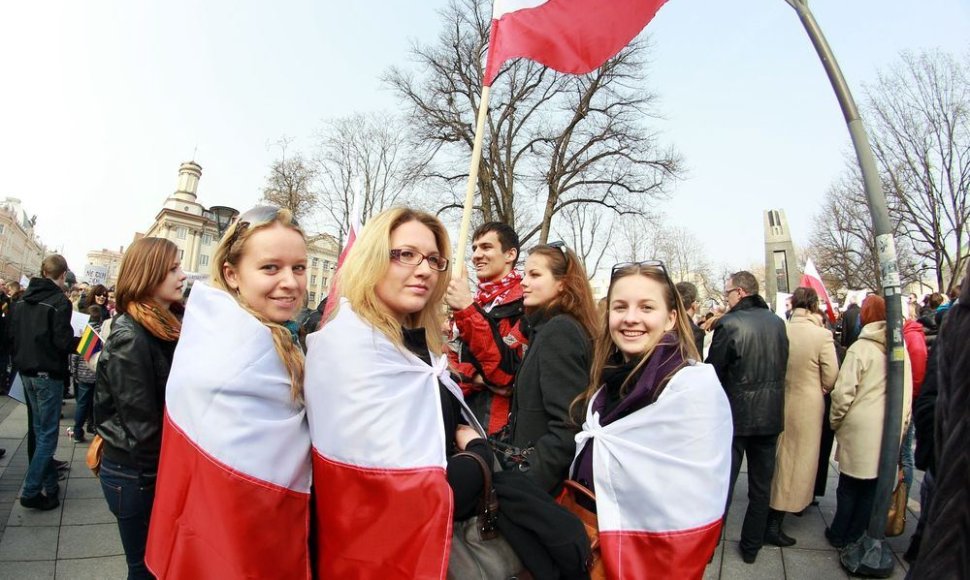“Things are not so bad. If we track how attitudes changed over time, we'll see that 2011 was the point when they got worse, the same year that the battle over Education Law started; however, what dominated online discussions were not abuses at the nation, but rather concern about incitement of enmity,” Bruževskis notes.
He says the study has revealed that Lithuanians are rather reserved and pessimistic people in general. Granted, they would not like their kids to marry Poles, but then again, they do not look favourably at having any foreign-speaking in-laws.
Politicians' harm
Laimonas Jaunyla, Polish-born journalist, points out that it was in 2008 and 2012 when relatively more respondents would say they did not want to be neighbours with Poles – the years of parliamentary elections. That goes to show, according to the journalist, that negative attitudes towards Poles are aggravated by politicians.
 |
| Juliaus Kalinsko/„15 minučių“ nuotr./Alvydas Nikžentaitis. |
Historian Alvydas Nikžentaitis agrees, adding that, unfortunately, state officials do not treat the Polish national minority the same way they treat Lithuanians. The same is reflected in Polish-dominated districts, where elected officials show similar attitudes to Lithuanian-speaking constituents.
People who called during the live broadcast claimed that Lithuanian-speakers feel discriminated against in predominantly Polish regions around Vilnius.
“We can see grudges on both sides. And such situation will persist unless Polish and Lithuanian politicians start a dialogue, unless Lithuanians start seeing [Polish-dominated] territories as their own,” Nikžentaitis says.
Lithuania's south-eastern regions around Vilnius are predominantly Polish-speaking and usually elect Polish politicians to both national and local governments. Nikžentaitis, who lives close to Polish neighbours, notes that when politicians of the Conservative Party start flashing around pre-electoral slogans that “It's time to take Vilnius back,” it only makes matters worse.
“That claim only mobilized Poles, to the extent that Poles who live in the city of Vilnius started declaring their place of residence at their parents' homes in Vilnius District in order to be able to vote for candidates there. A reckless phrase from a politician's mouth can rally national communities together. That's what the Education Law clearly demonstrated,” Nikžentaitis believes.
According to him, the study also reveals that future prospects look rather grim, if politicians continue exploiting the national minority issue in future political battles.
“We see trends that are highly negative and unless these developments are reversed, in several years time we'll be seeing completely different results, politicians will have truly antagonized the society and made some real problems in Polish-dominated lands,” he warns.
Better opinion on Lithuanians
One of the positive things revealed by the study, Nikžentaitis says, is that Polish respondents spoke well about Lithuanians and vice versa. According to the historian, Lithuanians themselves tend to nurture a far worse self-image than they are viewed by their Polish-speaking neighbours.
“Let's take the notion that Poles think Lithuanians to be drunkards. But if you look at what Lithuanians say – they think they are bigger drunkards than Polish see them,” Nikžentaitis notes.
According to him, Poles have a far more positive regard of Lithuanians than Lithuanians themselves. Moreover, they are more generous in their attitudes than Russians..
Jaunyla, journalist, confirms that Poles do not dislike Lithuanians, adding that at one point, Polish-speaking girls from Vilnius District would look for Lithuanian sweathearts, because it was trendy to marry a Lithuanian.
He also points out that relatively worse opinions regarding Poles – including their ill-feeling about intermarriage – were voiced by those Lithuanians who do not know any Poles personally.
“The study shows that we do not know each other, that we still live side by side, but not together,” he says.













